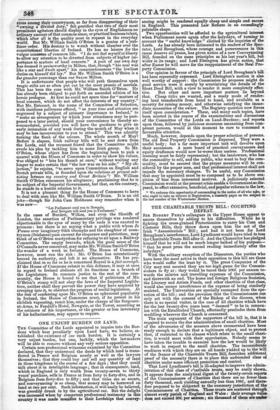ONE UNJUST BURDEN ON LAND.
THE Committee of the Lords appointed to inquire into the Bur- dens which bear peculiarly upon Land have, we believe, es- tablished the existence of one such burden. It is certainly a very unjust burden, but one, luckily, which the lawmakers will be able to remove without any very serious opposition. Certain non-professional witnesses examined by the Committee declared, that they understood the deeds by which land is trans- ferred in France and Belgium nearly as well as the lawyers themselves ; that they could buy and sell any quantity of land in those kingdoms in the course of a few days ; that they could talk about it in intelligible language ; that in consequence, land, which in England is only worth from twenty-seven to thirty years' purchase, sells in France at from forty to forty-five, and in Belgium from forty-five to fifty ; and that titles are so secure, and conveyancing is so cheap, that money may be borrowed on land at two per cent. Such information, it will easily be believed, was greedily drunk in by the agricultural ear. But the delight was increased when by competent professional testimony in this country it was made manifest to their Lordships that convey-
ancing might be rendered equally cheap and simple and secure in England. This presented Law Reform in an exceedingly palatable shape.
Two opportunities will be afforded to the agricultural interest when Parliament meets again after the holydays, of turning to account the "useful knowledge" elicited by the inquiries of the Lords. As has already been intimated to the readers of the Spec- tator, Lord Brougham, whose courage and perseverance in this cause deserve all praise, has given notice of a new Conveyancing Bill, founded on the same principles as his last year's bill, but wider in its range ; and Lord Ebrington has given notice, that after Easter he will move for the reappointment of the Real Pro- perty Commission.
Our opinion in favour of the principle of Lord Brougham's bill has been repeatedly expressed. Lord Ebrington's motion is also well worthy of support : the Commission he proposes might do good service were it merely by scrutinizing the details of the Short Deed Bill, with a view to render it more completely effec- tive. But other and more important matters lie beyond that. Cheap titles are wanted, and a ready mode of render- ing land transferable from hand to hand, and available as a security for raising money, and otherwise satisfying the imme- diate necessities of the owner. The Registry question now forces itself upon consideration.* These, and many such topics, have been mooted in the course of the examinations and discussions of the Committee of the Lords on Land-Burdens; and reports upon them, followed by judicious measures emanating from com- petent persons, would at this moment be sure to command a favourable attention.
Much, however, depends upon the proper selection of persons. i The old Real Property Commission s dispersed. They were a useful body ; but a far more important task will devolve upon their successors. A mere board of practical conveyancers and equity draftsmen would now be worse than useless. Professional learning must be fairly represented; but the landowner, who has the commodity to sell, and the public, who want to buy the com- modity, must be assured that the proper measures will be con- sidered by the proper men, and that professional interest shall not impede the necessary changes. To be useful, any Commission that may be appointed must be so composed as to be above sus- picion of bias from interested motives. A judiciously selected Commission would at the present crisis enable a Government so die- posed, to effect extensive, beneficial, and popular reforms in the law.
* We embrace this opportunity of commending to the notice of all who take, or who ought to take an interest in Registration, a masterly paper on the subject in the last number of the Westminster Review.


























 Previous page
Previous page